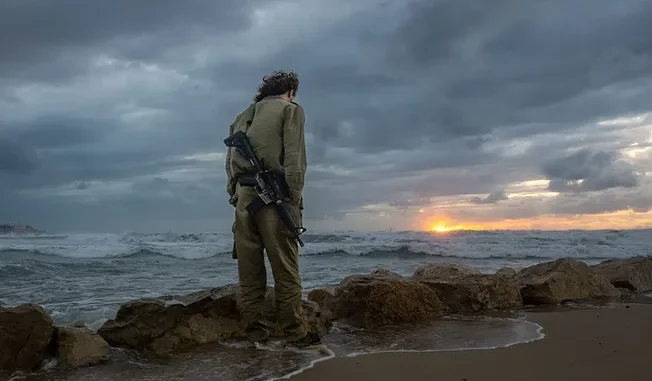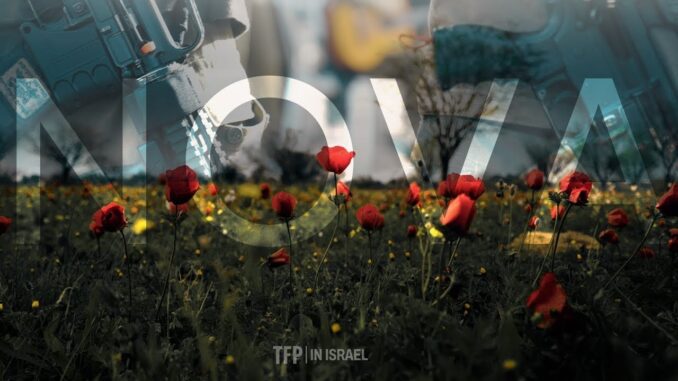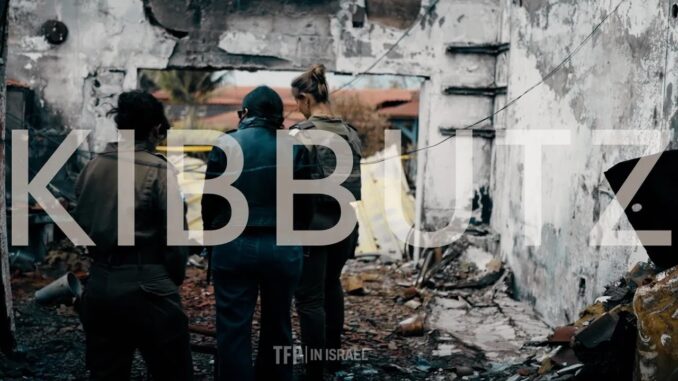A free society is only as strong as the citizens willing to defend it. Reflections and videos from my time on the ground in Israel.
By Bari Weiss, THE FREE PRESS 12 March 2024
 An IDF reservist watches the sunset at the beach on the fourth day of the temporary truce between Israel and Hamas on November 27, 2023, in Tel Aviv, Israel. (Alexi J. Rosenfeld via Getty Images)
An IDF reservist watches the sunset at the beach on the fourth day of the temporary truce between Israel and Hamas on November 27, 2023, in Tel Aviv, Israel. (Alexi J. Rosenfeld via Getty Images)
This is a special kind of story. Inside my column you’re going to see three mini-documentaries from our recent trip to Israel. The first two cover the massacres at the Nova Music Festival and Kibbutz Kfar Aza and the aftermath of those tragedies. In the third, we travel to the West Bank to talk to ordinary Palestinians about October 7, the war, and their futures. To watch the other interviews I did on that trip, and to make sure you never miss a Free Press video, subscribe to our YouTube channel. —BW
KIBBUTZ KFAR AZA — On a recent Tuesday morning I found myself two kilometers from Gaza. Every few minutes we could hear the boom of a 155 mm howitzer sending fire across the border, but I was trying to focus on the historian Michael Oren, who was talking to me not about the war raging around us but about Lucius Quinctius Cincinnatus, a Roman general who walked the world 500 years before Jesus was born, some 200 kilometers from the spot we were standing.
“Cincinnatus was a farmer. All he wanted was to be at his plow,” Oren told me as the winter rain poured down. “But every time he went back to his farm the Roman Republic came to him and said, ‘We need you to come back. We need you to lead an army.’?”
“The Cincinnatus myth was the foundational myth for the American Revolution, specifically for Washington himself,” Oren said. “It is also the most foundational Israeli myth. It is David Ben-Gurion. It is Moshe Dayan. It is Ariel Sharon. These people just wanted to farm. But they were called to pick up arms and defend their country. Israel is the Cincinnatus nation.”
Many have never heard the name Cincinnatus in Israel, where the Romans are remembered more as the empire that destroyed the Second Jewish Temple in Jerusalem in the year 70, slaughtered and sold its inhabitants, and renamed the land Syria Palestina. But the Jewish people—who long outlived that empire and reconstituted the Jewish national home in the land the Romans had once conquered—are also democratic heirs to Cincinnatus.
On the morning of October 7, ordinary Israelis left their offices, closed their laptops, and abandoned their fields to pick up weapons, in many cases without waiting for instructions from the state or its army.
On that black morning, and in the weeks and months since, these men and women have displayed the kind of heroism most thought belonged to the mythic past, or the generation of 1948, when the armies of five invading Arab nations turned every kibbutz and moshav, and every town and village, into a battlefield.
For twenty-first-century inhabitants of the Middle East’s start-up nation, such individual and collective courage had become something to be studied in the past—not enacted in the present. Not inside the land of Israel. Not in the twenty-first century. And certainly not by them.
But I met successors to Cincinnatus everywhere I went.
They are ordinary Israelis like Inbar Lieberman. Lieberman is a 25-year-old woman who is the security coordinator of Kibbutz Nir Am. She killed five terrorists by herself on October 7. The rest of her team repelled an additional 20 over the course of four hours. “I’m not a hero,” she says. “I wasn’t there by myself.”
Ordinary Israelis like my friend Jessica’s father-in-law, Noam Tibon, a 62-year-old grandfather who got in a jeep with his pistol and his wife, Gali. He drove south from Tel Aviv and shot his way through terrorists to liberate his son and granddaughters, who were hiding in their safe room in Kibbutz Nahal Oz from hundreds of Hamas terrorists who were swarming the kibbutz.
Or like Yair Golan, another 61-year-old retired general—his career cut short because of his leftist views—who drove alone through the fields near the Gaza Strip and followed pins dropped by panicked young people hiding in the bushes at the Nova music festival to save them.
Or like the special forces reservist who had just returned from vacation outside Israel. Then he got the call. “I didn’t understand by any means the scale of what we were about to get into. We’re on our way out and the commander says, all right, guys, load your weapons. We’re about to get into a firefight. And I was like, oh, shit, I did not see my Saturday going this way.” He went on: “There was no centralized command. No one was telling us what to do. We were just doing our job and going from one place to the other and doing our best.”
Or like Masad Armilat, the 23-year-old Arab Israeli I bumped into at a gas station where we stopped to buy a coffee near the killing fields of the music festival. On that day Armilat, who typically works in the storeroom, saved scores of wounded people. Meantime, his father “left his house and helped close all the paths into Ofakim, where the terrorists would have entered.”
Or like Rachel Goldberg Polin, who told me more than 100 days after her only son, Hersh, had his arm blown off and was taken into Gaza—she didn’t know if he was alive or dead: “I still think we have so many blessings.” She invoked Psalm 23—the poem King David wrote about his cup overflowing. “Right now it overflows with tears,” she said, “but I know it will overflow with joy again.”
Or like Arab Israeli news broadcaster, Lucy Aharish, who recalled watching that morning as her husband, Fauda actor Tsahi Halevi, having aged out of the reserves, nevertheless put on his old uniform and walked out the door. She thought through a plan she never imagined she would need: “If the terrorists come into this building, should I hide my son Adam in the washing machine? Or in the closet?”

To understand why this kind of courage—physical and psychological and even spiritual—needed to be summoned, and needs to be still, you need to understand the extent of what happened on that day.
This is a necessity not only because without an honest reckoning of the horror unleashed by Iran’s proxy on October 7 it is impossible to understand the existential urgency of the war of defense Israel is fighting, but also because nobody—not even America—is immune from history. And because, ultimately, a free society—including our own—is only as strong as the citizens willing to defend it.
Since the earliest hours of Saturday, October 7, we have been reporting on the war in Israel. Within 48 hours of the attack—before we understood that the southern part of Israel was still overrun with terrorists—our team had interviewed dozens of people: survivors who crawled out of the music festival, off-duty soldiers and older men who grabbed guns and headed into the fire, families whose loved ones had been stolen away into parts unknown. In the weeks and months since, we have published more than 50 pieces about this subject.
So I thought I knew.
But there is a difference between knowing something intellectually and standing in a killing field.
That’s where I met a young woman named Michal Ohana one recent afternoon.
Watch Michal and other survivors:
It was a windy day and we sat in plastic chairs in the spot where terrorists came to murder her and her friends. Michal had come from Portugal, where she was surfing, and had come here, to the site of the Nova music festival, because her friends were organizing it and they threw the best parties. She told me about hiding under a tank for seven or eight hours. “At some point I just saw that I was bleeding, and I understood that they had shot me in the leg. It was just war,” she said. “They fired the RPG on the tank. They threw grenades at us. I lost my hearing. And it was just waiting for death. We all knew we were going to die, we just didn’t know which way and when.” She said the Shema and waited.
So did Mazal. She’s Ethiopian Israeli and a new survivor in a land built by the old ones, who smokes as she talks about how the terrorists tied ropes around her legs and started dragging her into Gaza. By some miracle they thought she was dead. Her two best friends were—murdered on either side of her next to the highway.
“It was the worst thing I ever saw in my life. And I’ve seen a lot. And I’ve fought a lot,” Yair Golan, the retired general, tells me of what he witnessed that morning. “It’s hard to explain all this, what it looks like. I drove my car [on the road] between bodies. Bodies were spread all over the route, you know, from both sides of the route. On my right-hand side there were still fighting exchanges in kibbutzim.” He said it was “like entering into hell. Entering into a different universe.”
That’s what the special forces soldier who was early to the scene told me too. He had seen a lot in his more than eight years in service. But he says “nothing came close” to what he witnessed October 7.
“We saw from pretty far off the whole road that it was packed with cars. Hundreds of cars blocking the road, and all of them are blown up, destroyed, run over by tanks on fire. Absolute chaos. That’s the only way I can describe the feeling on this day. It was like a zombie apocalypse. Like those crazy films where you see the beginning when everything just goes to shit. That was the vibe. Everything’s on fire. Everything. You smell burning plastic and bodies and you hear gunshots everywhere.”
The fires that raged at Kibbutz Kfar Aza have long since burned themselves out. I stood there in what was once a family’s home but now was just blackened walls with no roof. The people who lived in this home were identified by their bones and their teeth. What was once a floor is now dust.
A few blocks away I stood in the burnt-out shell of a humble bungalow. A young couple named Sivan and Naor once loved each other here. There are remnants of them: a new pair of Sambas. An old bra. Some dirty dishes in the sink. But mostly there are holes. Hundreds and hundreds of gaping bullet holes in the room where the 23-year-olds were slaughtered. There are words scribbled on the wall: “Human remains on the sofa.”
Step into Kibbutz Kfar Aza:
“The word pain is a privilege compared to what we feel,” Rachel Goldberg Polin says to me about the experience of Hamas stealing her son, and I feel the words more than hear them. “Trauma is being hit by a truck after the truck has moved on. The truck is still on us. It’s like asking someone who is being raped what being raped was like.”

There was not a single conversation that I had in the week I spent in Israel where the person did not say a version of the following: There was an October 6 version of me and an October 7 version of me. I am forever changed. I am a different person.
And that is another sense in which the story of the ancient Roman requires modification. The binary of war and peace, the pastoral and the military, is a retrospective luxury of powerful nations or empires. A small democracy, whose very existence is contested by populous autocracies, does not have the privilege, as Cincinnatus did, of going from the field of battle to the field to till. Israel’s citizen-soldiers are scientists, artists, and farmers, just as they are mothers and fathers, husbands and wives. Israeli citizens, whether they serve or not, are not—as one Hamas leader said of Gazans—someone else’s problem.
“It’s like after you knock your finger with a hammer, you don’t feel anything for a while,” the journalist Gadi Taub said, describing what Israelis have gone through since Hamas’s invasion. “People haven’t begun to understand the extent of this earthquake and how it will change Israel. The tectonic plates have moved, and nothing in the system has yet absorbed or changed to accommodate what happened.”
The public intellectual and Bible scholar Micah Goodman told me in Jerusalem that the country went through a collective near-death experience. Imagine an entire society that, between sunrise and sunset, peered together into the abyss. “For the first time in our lives, we had a moment where we could imagine that the whole thing was over. That the whole thing ended. You know how when individuals have a near-death experience, they’re transformed. Because they learned that life should not be trivialized. As a country, we had a near-death experience, and now we’re transformed because we know that Jewish sovereignty should not be taken for granted. It can’t be trivialized.”
Israel’s founding fathers and mothers, having known a period when Jews didn’t have a state—a period in which six million Jews were murdered—understood the difference between statelessness and sovereignty in their bones. The paradox of their extraordinary achievement is that modern Israelis, who might appreciate the distinction intellectually, could dismiss the dread alternative even when presented with visible evidence of a fragility they consigned to the past. Or at least they could until October 7. On that day, the thought exercise became real.
If Israel, in other words, is currently fighting a second war of independence—an existential war necessary for the survival of the state, as everyone here believes—then the young men and women of this country are more than soldiers. They are latter-day Ben-Gurions. They are a new generation of founders. Indeed, as Gadi Taub told me in Tel Aviv, one of the slogans of this war is lo noflim midor tachach! Which loosely translates to do not fall short of the ’48 generation.
Hearing that phrase, I couldn’t help but think of America. These days in the U.S., it is nearly impossible to imagine a modern George Washington—a leader who would charge into battle ahead of the troops, put the nation ahead of himself, and willingly give up power. Can you picture the people running our hedge funds and start-ups leaving them behind for the battlefield? Or a rallying cry about not falling short of the 1776ers?
And yet before October 7, despite the country’s universal draft, many Israelis say they, too, believed that history and heroism were things that belonged to the past. Theirs was a nation, like ours, that was addicted to likes and to TikTok, hopelessly unserious, run by an elite with all of the noblesse but none of the oblige.
Then the most serious thing imaginable was upon them. And the most serious men and women I have ever encountered emerged to confront it.
They sound like the writer Haviv Rettig Gur: “We will continue as our forefathers and foremothers did before us: to live on our sword. We will defend ourselves. We will stand united against enemies who want to destroy us. And they actually want to destroy us. This isn’t World War I–style propaganda. They say it. They’re actually coming for us,” he told me in Jerusalem. “We’ve become humble and we’ve become simple: we stand up for ourselves.”
To Listen to the voices of Palestinians and continue reading:





John Galt III… You should live in Canada…
On the other hand, the author quotes another author (Haviv Rettig Gur): “We will continue as our forefathers and foremothers did before us: to live on our sword…”
Nice article – but no recognition from Weiss who is an American as to the necessity of arming all Israeli Jews. Israel’s choice in this matter baffles me.
The only answer I can come up with is that they don’t trust their own citizens. The other answer is ridiculous and that is the idea that the police and IDF will protect you. After October 7th we know that is a total lie and utter nonsense.
Right now Hezbollah could rush across the border and attack and that is one reason Israel has evacuated 80,000 Jews from Northern Israel. The other of course is the assortment of rockets being fired daily and Israel’s choice at this time to not have a two front war. If I were a Northern Israeli Jew and eventually was allowed to go home Israel better allow me to have a weapon or what is the damn point of living there.
Ben Gvir, Minister of National Security has announced that Israel has since October 7th issued 100,000 permits to own a weapon. So doing the math – 6,200,000 Jews don’t have a weapon. The other roughly 900,000 Jews with weapons are IDF soldiers, IDF reservists, police, security personnel and existing permit holders.
Permit???? I need a damn permit to defend myself. That is totally insane.